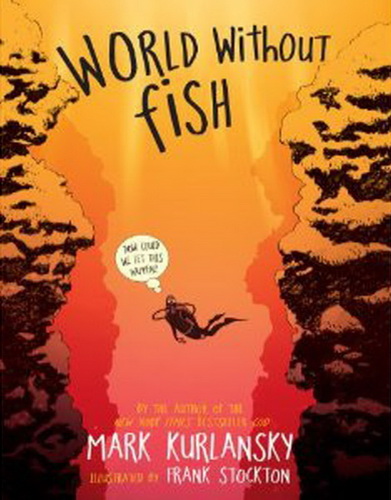
The Panda Book Awards are a set of children’s literary prizes for international books, co-sponsored by beijingkids and awarded by readers across China. Read all about The Panda Book Awards here, and check out the weekly reviews on beijingkids here.
As co-host, beijingkids is offering an extra 20% discount on those books for our readers. This blog shows you how to use our code to get the discount and make cash-on-delivery purchase from Amazon.cn.
Reviewers: Steven Kim of Harrow International School Beijing
Book: World Without Fish by Mark Kurlansky
Category: Older Readers (Grades 6-8)
Steven writes: "World Without Fish was a practical and very world-caring book. It talks about how most fish are endangered because there are so many fishermen in the world. For example, in a 250 mile stretch of its own coastline, Canada has eaten nearly all of its haddock because so many fishermen have caught them.
The book goes on to say that long ago there used to be lots of other fish species, but now many are either extinct or endangered. Jellyfish have survived the longest and have been around for millions of years, but nobody wants to eat them. If we keep on fishing like this, there will be barely any fish left in the world in eighteen years! All we’ll probably have left is a few jellyfish and leatherbacks.
The main point of the book was that if we keep eating so many fish, it will be harmful to the food chain. If we humans eat too many of one type of fish, the species which eats them will starve and die out. This would be a big problem for the oceans. In conclusion, I suggest that we should eat as little fish as we can. Then the fish can reproduce and we won’t have to worry about them!
I found the book to be interesting and important. It also includes some very famous authors who write about the future of the oceans. I would recommend it to everybody."
Overview: Mark Kurlansky, beloved author of the award-winning bestseller Cod: A Biography of the Fish That Changed the World, offers a riveting new book for kids about what’s happening to fish, the oceans, and our environment, and what, armed with knowledge, kids can do about it.
Written by a master storyteller, World Without Fish connects all the dots—biology, economics, evolution, politics, climate, history, culture, food, and nutrition—in a way that kids can really understand. It describes how the fish we most commonly eat, including tuna, salmon, cod, and swordfish, could disappear within 50 years, and the domino effect it would have—oceans teeming with jellyfish and turning pinkish orange from algal blooms; seabirds disappearing, then reptiles, then mammals. It describes the back-and-forth dynamic of fishermen and scientists. It covers the effects of industrialized fishing, and how bottom-dragging nets are turning the ocean floor into a desert.
The answer? Support sustainable fishing. World Without Fish tells kids exactly what they can do: Find out where those fish sticks come from. Tell your parents what’s good to buy, and what’s not. Ask the waiter if the fish on the menu is line-caught And follow simple rules: Use less plastic, and never eat endangered fish like bluefin tuna.
Interwoven with the book is a full-color graphic novel. Each beautifully illustrated chapter opener links to form a larger fictional story that complements the text. Hand in hand, they create a Silent Spring for a new generation.
Publishers overview via Amazon.com



